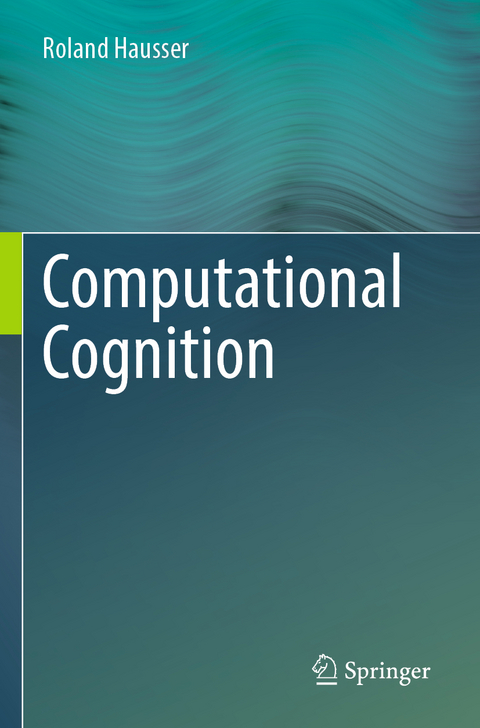
Computational Cognition
Springer International Publishing (Verlag)
978-3-031-37501-9 (ISBN)
Modern science is divided into three parts: natural sciences, engineering sciences and humanities. Over the last millennia, natural and engineering sciences evolved a symbiotic relationship, but humanities still stand apart. Today, however, designing and building a talking robot is a comparatively new challenge for which all three branches are needed. Starting from the idea that designing a theory of computational cognition should be as complete as possible, and trying to answer questions such as "Which ontology is required for building a computational cognition?", the current book integrates interfaces, components, functional flows, data structure, database schema, and algorithms into a coherent system with an extensive range of cognitive functions, and constitutes the background to the book "Ontology of Communication" recently published by the author (Springer, 2023).
Part I discusses ontological distinctions between a sign-based and an agent-based approach, and continues with explanations of the data structure, the content-addressable database schema; the time-linear derivations of the speak and the hear mode; resonating content; induction, deduction, and abduction in inferencing, and concludes with a reconstruction of eight classical syllogisms as a test suite for DBS inferencing in the think mode.
Part II complements the literal use of language in the speak and hear mode with a reconstruction of syntactic mood adaptations and figurative use. The database schema of DBS is shown to lend itself not only to the tasks of traditional storage and retrieval, but also of reference, coreference, shadowing, coactivation of resonating content, and selective activation.
Part III complements the treatment of individual topics in linguistics, philosophy, and cognitive psychology with an overall software structure in the form of three interacting main components, called the interface, the memory, and the production component.
Roland Hausser is Professor Emeritus for Theoretical and Computational Linguistics at the University Erlangen-Nürnberg and former director of its Laboratory of Computational Linguistics (CLUE), between 1989 and 2011. After obtaining his PhD at the University of Texas at Austin, the author held various positions at Carnegie Mellon, Stanford University or Ludwig-Maximilians-Universität München.
Prof. Hausser has been active and made significant contributions in the fields of Theoretical and Computational Linguistics, Human-Computer Interaction, Formal Grammars and Database Semantics. His research resulted in around 40 journal papers and conference proceedings, and he is the author of the Springer books "Foundations of Computational Linguistics", "A Computational Model of Natural Language Communication", "Computational Linguistics and Talking Robots" as well as of the very recent "Ontology of Communication".
Preface.- Part I. Semantics.- 1. Ontology.- 2. Algorithm.- 3. Content Resonating in Memory.- 4. Logical Reasoning.- 5. Common Sense Reasoning.- Part II. Pragmatics.- 6. STAR-0 Content: Origin.- 7. STAR-1 Content: Speaker's Perspective.- 8. STAR-2 Content: Hearer's Perspective.- 9. Pragmatics of Figurative Use.- 10. Nonstandard Variants of Pragmatics.- Part III. Data-Driven Behavior Control.- 11. Interface Component.- 12. Memory Component.- 13. Operation Component.- 14. Degrees of Abstraction.-15. Conclusion: the Fundamental Alternatives.- Bibliography.- Name Index.- Subject Index.
| Erscheinungsdatum | 06.09.2024 |
|---|---|
| Zusatzinfo | XVIII, 235 p. 64 illus. |
| Verlagsort | Cham |
| Sprache | englisch |
| Maße | 155 x 235 mm |
| Gewicht | 394 g |
| Themenwelt | Geisteswissenschaften ► Sprach- / Literaturwissenschaft ► Sprachwissenschaft |
| Informatik ► Theorie / Studium ► Künstliche Intelligenz / Robotik | |
| Technik | |
| Schlagworte | Categorical Grammar • Computational Cognition • Computational Pattern Matching • Database Semantics • Data-Driven Cognitive Processing • DBS Inference • Generative Grammar • Memory Content Reasoning • Montague grammar • natural language • Predicate Calculus • Robot Language Cognition • Semantics • Speak Mode Derivation • Substitution-Driven Computation • talking robots • Time-Linear Hear Mode Derivation |
| ISBN-10 | 3-031-37501-7 / 3031375017 |
| ISBN-13 | 978-3-031-37501-9 / 9783031375019 |
| Zustand | Neuware |
| Informationen gemäß Produktsicherheitsverordnung (GPSR) | |
| Haben Sie eine Frage zum Produkt? |
aus dem Bereich


